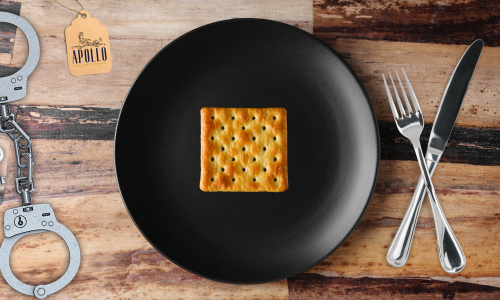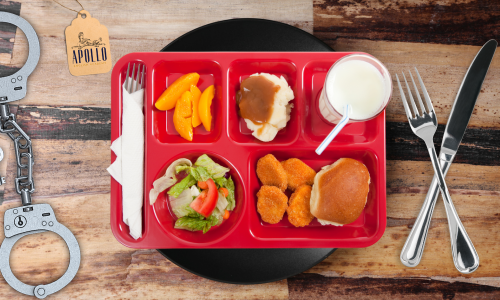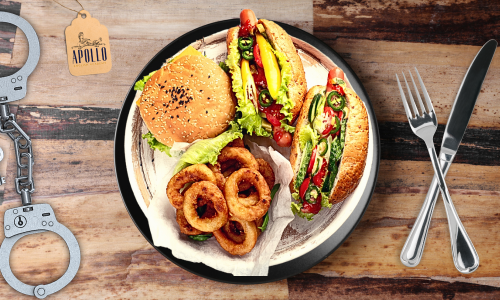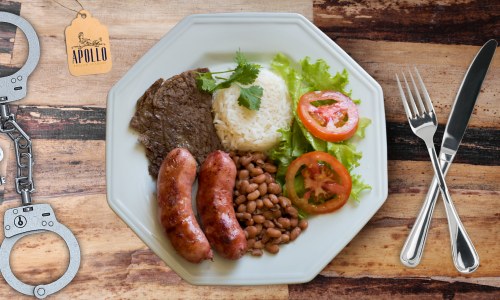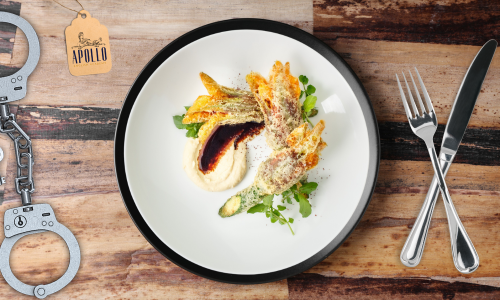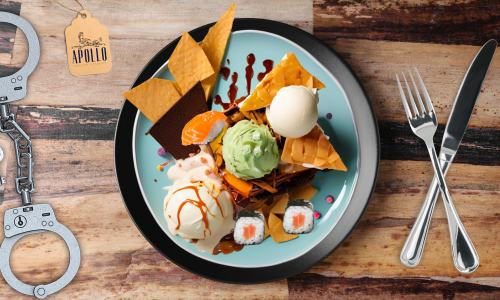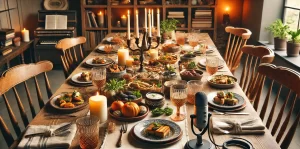Introdução:
A comida está em todos os lugares — na nossa rotina, nas nossas memórias e, claro, na forma como nos expressamos! No inglês, o food vocabulary vai muito além de ingredientes e receitas, aparecendo em expressões idiomáticas que deixam a comunicação mais rica e divertida.
Neste artigo, vamos explorar como a comida tempera o idioma, desde frases exageradas sobre fome até palavras usadas para descrever aquela refeição inesquecível. Então, prepare seu apetite linguístico e descubra como levar seu inglês para outro nível com essas expressões deliciosas! 🍽️✨
📖 Aqui você encontra…
clique para verNível:
A2 (pré-intermediário)
Objetivo:
Expandir o vocabulário relacionado à comida e expressões idiomáticas em inglês, além de compreender como a gastronomia influencia a linguagem.
Tópicos gramaticais abordados nesse texto:
- Present Simple: Usado para descrever hábitos e verdades gerais, como em “Food is more than just fuel.”
- Modal Verbs: Para expressar possibilidade e hábitos, como em “You can add some drama” e “This could be a midnight burger.”
- Comparatives and Superlatives: Utilizados para enfatizar características, como em “This is a little more formal.”
- Relative Clauses: Para adicionar informações a um substantivo, como em “Thanksgiving dinner, which is an American tradition, is considered a feast.”
- Idiomatic Expressions: Expressões populares como “I’m so hungry I could eat a horse” e “guilty pleasure”.
- Expressions of Time: Como “every second,” “once in a while” e “late-evening meal”, que ajudam a situar eventos no tempo.
The Language of Food: Expressions That Spice Up Your English
Food is more than just fuel — it’s an experience, a memory, and sometimes, a great way to express how we feel. In our latest episode of the Apollocast, we dived into the world of food and asked an important question: What would be your last meal on Earth? But beyond delicious dishes and guilty pleasures, food has also made its way into the English language. From casual expressions to more formal terms, let’s explore how food influences the way we talk. Grab a snack and enjoy the feast of words!
Guilty Pleasures and Comfort Foods
We all have that one dish we love but feel a little embarrassed to admit. That’s a guilty pleasure! It could be a midnight burger, an entire tub of ice cream, or that instant ramen you swear you only eat “once in a while.” If it makes you feel good but you wouldn’t order it on a first date, it’s probably a guilty pleasure!
Speaking of feel-good food, let’s talk about comfort food. This is the kind of food that brings warmth to your soul. Maybe it’s your grandma’s homemade soup, mac and cheese, or a plate of fresh-baked cookies. Comfort food isn’t about fancy ingredients — it’s about the feeling of home.
When You’re So Hungry, You Could Eat a Horse
We’ve all been there — stomach growling, feeling weak, thinking about food every second. When you’re extremely hungry, instead of just saying, “I’m very hungry,” you can add some drama: “I’m so hungry I could eat a horse!” (Of course, no horses are actually involved — it’s just a fun exaggeration!)
Another way to say you’re starving is “I’m famished.” This is a little more formal, but it still expresses the idea that you need food ASAP.
Dinner, Supper, or a Feast?
English has several words for the last meal of the day. In the U.S., people usually call it dinner. However, in some regions, supper is used instead, often referring to a lighter, late-evening meal. If you ever visit the UK or parts of the southern U.S., don’t be surprised if someone invites you for supper instead of dinner!
Now, if you’re talking about a big, extravagant meal, that’s a feast! Thanksgiving dinner? A feast. A huge holiday banquet? A feast. If there’s a ridiculous amount of food and no one leaves hungry, you’ve got yourself a feast.
A Bite of Culture and Language
Food is more than just something we eat — it’s a part of our culture, our habits, and even our language. Whether you’re talking about your favorite comfort food, admitting your guilty pleasure, or joking about being able to eat a horse, food expressions make conversations more colorful and fun.
Conclusion
Now, tell us — what’s your guilty pleasure? And more importantly, what would be your last supper? Drop your answers in the comments!
Want to learn English in a fun and natural way? Join the Apollo Academy today and bring flavor to your language skills!
Bora com um quiz pra lá de criminoso?
Commit Some Minor Crimes and We’ll Give You a Last Meal! 🍽️🚔
We’re not saying you should commit these tiny crimes… but if you did, what would your last meal be? Answer these questions and find out!
1️⃣ You see a “Wet Paint” sign. What do you do?

2️⃣ The shopping cart is just a few steps from the return area. What do you do?

3️⃣ You’re at the movies and brought snacks from home. How do you act?

4️⃣ The “10 items or less” line at the grocery store. What do you do?

5️⃣ You’re in a museum. There’s a big “DO NOT TOUCH” sign. What happens next?

6️⃣ The elevator has an Emergency Stop button. What do you do?

7️⃣ You just realized you got extra change from a cashier. What now?

8️⃣ Your friend leaves their phone unlocked. What do you do?

9️⃣ The speed limit says 60 mph. How fast are you going?

🔟 You see a “No Trespassing” sign. What’s your move?

